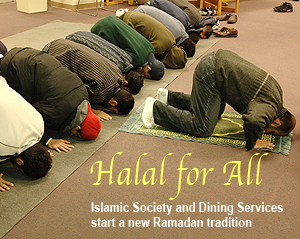Halal for All
Islamic Society and Dining Services start a new Ramadan tradition

Sunday through Thursday nights in October, the differences between the main dining hall in West Campus and the private dining area in the corner weren’t obvious. But they were important all the same.
The food was similar to what was being served at dining halls across campus, but the meat entrée was halal, prepared in accordance with Islamic law. The students weren’t from just Boston University — they came from schools and colleges all over the city. And although many of them had broken the Ramadan fast together before, this was the first time they were able to sit back and let University Dining Services take charge.
“They prepare the food, take care of the setup, and clean up everything,” says Yasir Bugrara (ENG’06), the ameer, or president, of BU’s Islamic Society. “The only thing we do is show up.”
This is the first year that Dining Services has been able to provide a full-service halal meal for students breaking the Ramadan fast each evening, and Dining Services director Josh Hubbard says that the option has been a great success. The meal takes place between two evening prayer services and is open to any student participating in a meal plan or purchasing a meal ticket subsidized by the Islamic Society. The food is standard fare prepared to halal dietary laws. It has worked so well, Hubbard says, that Dining Services is discussing ways to offer more halal dining year-round.
“This has been a real benefit to the community,” he says, “and something we want to keep in place.”
During Ramadan, the ninth month of the Islamic year, which marks the date the first verses of the Koran were revealed, observant Muslims refrain from eating and drinking between sunrise and sunset. “There are two main reasons for fasting,” Bugrara explains. “One is to remember God in your everyday life and your everyday decisions, and the second reason is to do more good deeds. It’s supposed to be when you’re in your best character, and 30 days of doing that is supposed to form some sort of habit so you are always that better person.”
The term halal refers to anything that is permissible under Islamic law; when applied to food, it refers to both the type of food and the way it is killed. Pork, blood, and alcohol are all considered haraam, or forbidden; meat can also be haraam if it is killed improperly.
In the past, the Islamic Society always handled the breaking of the day’s fast, Bugrara says; members would get local restaurants that serve halal food to cater the meal and would meet in the lounge at 1019 Commonwealth Ave. It was fun, he says, but a lot of work, particularly since most of the students had to study or work after finishing the prayers and cleaning up.
Working with Dining Services, the challenge was finding a way to open the meal up to students who don’t normally participate in a dining plan. Through fundraising, the Islamic Society was able to offer these students — as well as their friends from other schools — discounted meal tickets that allow them to swipe into the dining hall. “We wanted to make sure it wasn’t exclusionary,” Hubbard says. “There’s been a wonderful cross-section of the Islamic community that comes and eats with us.”
The halal meals are offered Sundays through Thursdays, allowing students to travel home or participate in Islamic Society events on weekends.
Ramadan concludes with Eid al-Fitr in early November, but Dining Services plans to continue offering halal meals on a regular basis for the rest of the year. “We want to make sure,” Hubbard says, “that all the good work that’s been done here doesn’t get lost.”